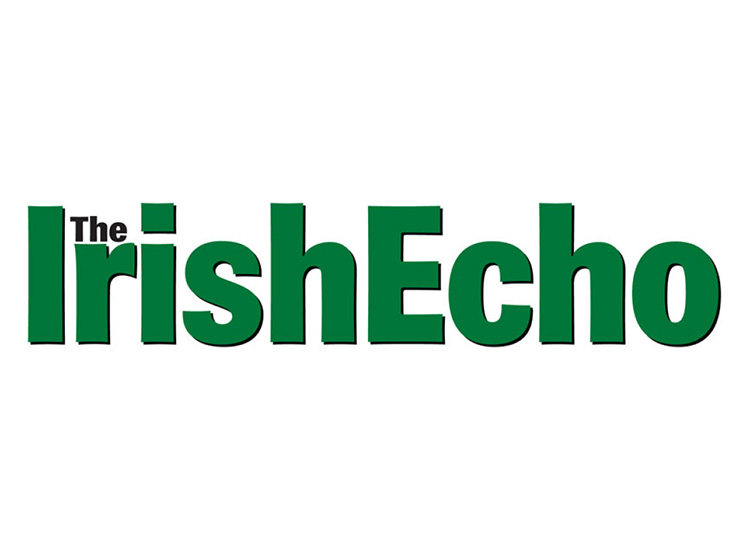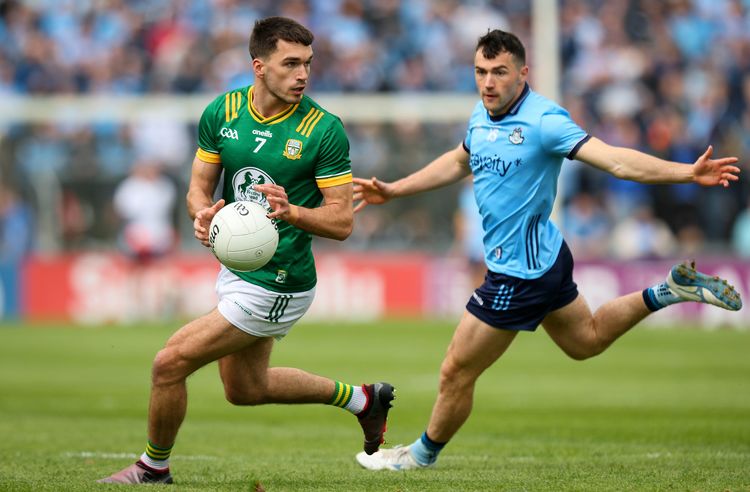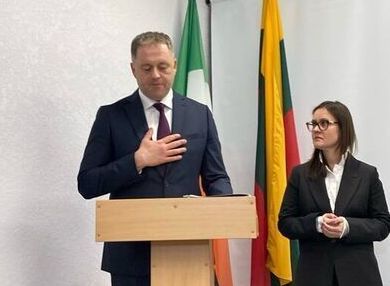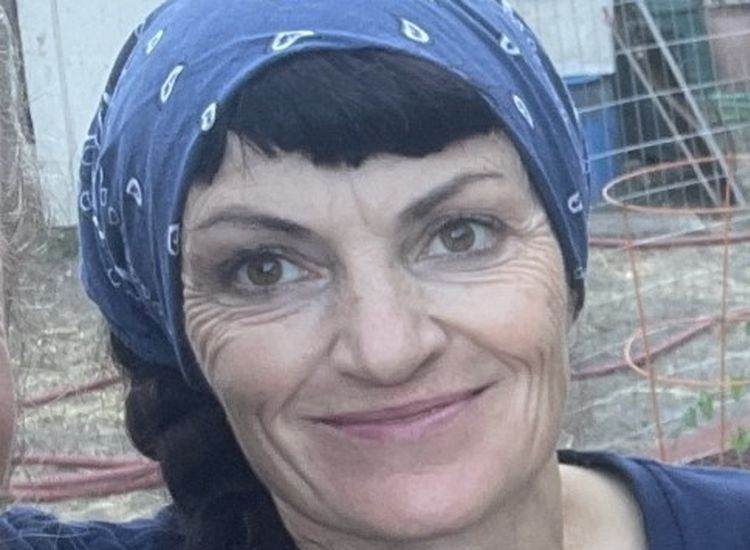Pictured at Georgetown University (l-r) Irish Ambassador Dan Mulhall, Rep. David Joyce (R), Rep. Brendan Boyle (D) and Minister Helen McEntee
By Irish Echo Staff
The Irish government’s Minister of State for European Affairs, Helen McEntee, was in Washington, D.C. last week for a series of engagements that included meeting with members of Congress and an address at Georgetown University on the theme of ‘‘Ireland – Gateway to the Atlantic.’’
Speaking ahead of the visit, Minister McEntee said: “We are at a crucial time for transatlantic relations, when EU-U.S. cooperation is all the more essential. I am confident that Ireland can play an important role in strengthening this cooperation and am looking forward to exploring opportunities to do so with our partners in the United States.”
The Georgetown address was as part of the “Bridging the Atlantic Conference” hosted by Georgetown University and the UCD Clinton Institute.
McEntee also engaged with business leaders at a roundtable discussion with the U.S. Chamber of Commerce and the Association of Women in International Trade.
In her speech she stated in part: “In the cold of January 1919, one hundred years ago, twenty-seven delegates gathered in the Round Room of Dublin’s Mansion House to inaugurate Dáil Éireann, the first modern Irish parliament.
“Their meeting lasted under two hours. But changed forever the course of our island’s history. Working through the Irish language, but translating also to English and French, those first parliamentarians adopted a provisional constitution and agreed three foundational texts – a Declaration of Independence; a Democratic Programme; and, finally, a ‘Message to the Free Nations of the World.’
“A vision of what an independent Ireland might offer the world, that message affirmed that:
‘Internationally, Ireland is the gateway of the Atlantic. Ireland is the last outpost of Europe towards the West: Ireland is the point upon which great trade routes between East and West converge...’
“From her very inception, then, our state has been global in outlook. Conscious that – culturally and politically, as much as geographically – we lie at the point where east and west converge. At the centre of transatlantic relations. Part of Europe. But inextricably bound to America. For, as President Kennedy put it, though we may be ‘’Divided by distance, our two nations have been united by history.’’
Few institutions better reflect that than Georgetown University.
“The College’s founder, Bishop John Carroll, was the son of Offaly man, Daniel Carroll. And brother to another Daniel, one of only five men to sign both America’s Articles of Confederation and her Constitution. The beautiful building in which we now convene, Healy Hall, owes its name to Georgetown’s so-called ‘‘second founder,” Patrick Healy. His father too was an Irishman, Michael Healy, a Roscommon emigrant who became a Georgia plantation owner.
“His mother, Mary Eliza Smith, was a slave, with whom Michael fell in love, married and raised a family, but who, by the perverse laws of that time and place, was branded always as his property. “Finally, this conference is the legacy of a third Georgetown Irish founder, Edmund A. Walsh - an internationalist, born in an Irish enclave of Boston, who a century ago had the foresight to establish this nation’s first School of Foreign Service. Called by his heritage, he lived for a time in Ireland, studying at the University of Dublin. Carroll, Healy, Walsh - their achievements speak to the enormous and enduring contribution Irish emigrants have made to this nation.
“And to the unique ties that bind our states still. It’s a legacy worthy of celebration. And it’s in part to that end that this conference was convened.
“But, as the Irish Parliament and the Walsh School of Foreign Service face into our second centuries, it’s also a challenge: How to build on those remarkable foundations? How to renew and refresh our unique cultural and emotional ties?
“Above all, perhaps - viewed from my role as Minister for European Affairs - how first to safeguard, and then to strengthen, the essential partnership between the European Union in which Ireland has built her home, and that we hold to be our most important ally and dearest friend across the Atlantic?
“In a rapidly changing world, new challenges are emerging which no country can address alone. It would be naïve to imagine that these emerging challenges do not put pressure on, and present tensions for, the transatlantic relationship. We have seen this in the context of global trading relations, in the evolving digital sphere, in foreign policy and defence issues.
“These challenges however make transatlantic cooperation more, not less, essential.
For Ireland, part of the answer to the question of how to strengthen transatlantic relations lies in our response to perhaps the most pertinent challenge – Brexit.
“As Minister these past three years, my energies have been directed towards offsetting the considerable risks Brexit poses to Ireland and our EU partners. From the day of the Brexit referendum in Britain, the Government has made clear that, much as we regret that the UK is leaving the EU, we respect and reluctantly accept that decision. Our goal has not been to hinder Brexit, but to work with the UK and our EU partners to ensure an orderly withdrawal. Above all, a Brexit which protects the integrity of the Good Friday Agreement, and the open border, all-island economy and peace we have enjoyed these past two decades.
“Over the past eighteen months, we’ve secured not one, but two separate agreements – first with Prime Minister May and now with Prime Minister Johnson – which deliver these objectives.
Both agreements followed extensive negotiations, and both demanded compromises on all sides.
“But, protracted as the process may have been, we’re satisfied that the outcome is a good one – a legally operable text which delivers Brexit, while protecting the rights of EU and UK citizens, providing for a fair financial settlement and, crucially for Ireland, safeguarding the Good Friday Agreement. This was made possible by the tireless efforts of a brilliant negotiating team at the European Commission, led by Michel Barnier.
“By the remarkable, and rock-solid, solidarity of Ireland’s partner governments across twenty-six other European capitals. By the commitment of the British Government to the peace process and, ultimately, their recognition of the need to hold true to the agreement which underpins it.
And, finally, in no small part, by the support of our friends across in the United States, above all here in Washington.
“This morning I visited Capitol Hill, where I met members of the Congressional Friends of Ireland Caucus. From its inception four decades ago, the Caucus has been strictly bipartisan - both on the Hill and in respect of Northern Ireland.
“And, as for the United States - e pluribus unum - and as for modern Ireland, that diversity has been a source of strength.
“From Tip O’Neill to Richie Neal, Ted Kennedy to Pete King, and Daniel Patrick Moynihan to David Patrick Joyce, the Caucus’s members, Democrat and Republican, helped lay the foundations for the Good Friday Agreement.
“A compromise which, of course, was brokered by a Senator from New England. Which was guaranteed by international law, laid at the United Nations in New York. And which, ultimately, delivered not only a new Ireland, but a new era for Anglo-Irish relations.
“Over the past three years, and the past nine months in particular, Congress has made clear how highly you valued those hard-won gains. That message carried across the Atlantic. It was heard along the streets of Dublin, the meeting halls of Brussels, the corridors of Westminster. At critical junctures through the negotiations, it was reinforced by visits from senior Congressional delegations – of which both Congressman Boyle and Joyce were part.
“By House resolutions which they and others sponsored. By statements from Speaker Pelosi. Interviews, speeches and op-eds penned by Chairman Neal. And, yes, by the tweets of Congressman King, Senator Murphy and many, many others. It had its effect.
“No Brexiteer, however ardent, could maintain that a transatlantic trade agreement would prove possible post-Brexit, if the Good Friday Agreement were undermined in its passage.
“What will happen following next week’s elections in the UK no one can say with certainty. But we believe it’s in the best interests of all that we move to swiftly ratify the new withdrawal agreement, and press ahead to formally open negotiations on the future relationship between the UK and the EU.
“Reflecting the tremendous influence the UK exerted in shaping the EU these past decades, Brexit will change the balance of the Union. Indeed, it has already started to do so.
“This conference provides a space to reflect on what such change might entail. What it might mean for transatlantic relations. And what new challenges, as well as opportunities, it may represent for Ireland as the EU Member State which - in language, law, culture and custom - is most closely bound with the US.
“In his seminal work ‘Ireland 1912-85: Politics and Society’, historian JJ Lee observed that:
‘Small states must rely heavily on the quality of their strategic thinking to counter their vulnerability to international influences. Without superior strategic thinking, they will be buffeted rudderless, like a cork on a wave.”
“Or as the Irish proverb has it, more succinctly, ‘an té nach bhfuil láidir, ní foláir dó a bheith glic – he who is not strong, must be smart.’
“Part of being smart means recognising one’s limits – no matter how effective our diplomacy might be, Ireland’s influence in Brussels will only be felt as we strengthen alliances with our partners in the EU. But equally, being smart means recognising one’s strengths – and amplifying them.
“Amongst our nation’s greatest assets is our openness – openness to ideas, to investment, to people.
“Reflecting that, our Government has developed a strategy, Global Ireland 2025, to enhance Ireland’s place in the world, to double our footprint. Under it, we’ve bolstered funding for our award-winning development aid programme and committed to doubling it to €2 billion in the next decade.
“In keeping with our long history of peacekeeping and multilateralism, we’ve launched an energetic campaign to secure a non-permanent seat on the UN Security Council for the term 2021-2022.
And, as other countries are closing borders, we’re opening doors, extending our diplomatic network. And bolstering the dynamic state agencies which have played such an important part in our economic development.
“In February, we published a strategy for stepping up engagement with the United States and Canada specifically – a summary of which you have before you. As part of this, in October our Taoiseach opened a new Consulate General in Los Angeles, Ireland’s eighth bilateral diplomatic mission in the US.
Next year we open our ninth in Miami. And as we’re expanding, we’re also deepening, including bolstering the team Ambassador Mulhall leads here in D.C. And, through their efforts, pursuing a new dialogue with the administration and new partnerships with educational and cultural institutions across the U.S.
“Finally, to reinforce our political ties we’ve set out to double the number of high-level Government visits in both directions. And in the nine months since the strategy was published, we’ve welcomed the President, Vice-President and Speaker to our shores, as well as two major Congressional delegations.
“As we expand our presence and deepen our engagement, we do so as a proud member of the European Union, committed to using our position to strengthen transatlantic ties. Our message is a simple one: that the EU and U.S. are strongest when working together providing leadership to tackle global challenges. We may disagree on the methods but we will continue to make the case for doing more together and doing so quickly.
“But this is just a start. If Ireland is to fulfil the vision of our first parliamentarians, if we are to be the gateway of the Atlantic, if we are to fill part of the vacuum in EU-US relations left by the UK’s departure from our union, we know that more, much more, will be needed.
“The tradition of Thanksgiving dates back to the original pilgrims. But the holiday celebrated last week owes its modern form to two brilliant leaders, who held America’s highest office in the darkest times.
“In 1863, months after the Battle of Gettysburg, Abraham Lincoln proclaimed Thanksgiving a federal holiday. In 1941, weeks before Pearl Harbour, Franklin Delano Roosevelt fixed its current date as the fourth Thursday in November.
“Four years later, out of the smoldering ashes of that most brutal war, the country set out to forge a new liberal world order. The Marshall Plan laid the foundations for a democratic Europe, from which the EU would in time spring.
“The United Nations created a framework where states could resolve differences through diplomacy. The IMF supported financial stability, the World Bank economic development. And the General Agreement on Trade and Tariffs, later the World Trade Organisation, promoted open trade.
These multilateral structures – framed by American minds, some of them educated in this very school – provided the basis for ‘the long peace’ the world has since enjoyed.
“For the prosperity which has seen billions rise from poverty globally. As Secretary of State Cordell Hull put it, ‘‘when goods cross borders, armies don’t.”
“I’m thankful for this international order, imperfect as it may be. Thankful to live in a continent where, eighty years after Europe plunged into its bloodiest war, three decades after the Berlin Wall was finally torn down, the leaders of European nations which once traded fire, now clasp hands.
“Thankful to live on an island where, twenty-one years after a peace brokered by a US Senator, we join to honour the memory of those who died at Messines, as well as the GPO. Thankful for the transatlantic partnership – friendship - which made all this possible. Thankfully, yes. But more than that. Determined.
“For fifty-six years on from his assassination, I recall the wisdom President John F Kennedy penned in his final Thanksgiving Proclamation: ‘As we express our gratitude, we must never forget that the highest appreciation is not to utter words, but to live by them.’
“Like Lincoln and Roosevelt before him, Kennedy died by the words he lived. And so it is that his words, like their deeds, live forever. So friends, this year, let us determine not simply to give thanks.
But, mindful of those great leaders, and of all that that the United States and Europe achieved together, let us strive to preserve and protect what we give thanks for.”










